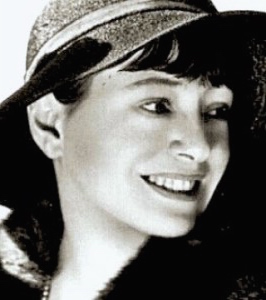“Our vicious little group was so competitive, always arguing over who was the first to coin a phrase or invent a joke. But does it even matter? Maybe Groucho said it first. Or maybe George Kaufman wrote it and Groucho just read it. Or perhaps Mr. Benchley said it first and I repeated it and Kaufman wrote it and Groucho made it famous. But who really cares? In the end, does any of it matter?” Dorothy Parker to Violet Epps, about the Algonguin Round Table group.
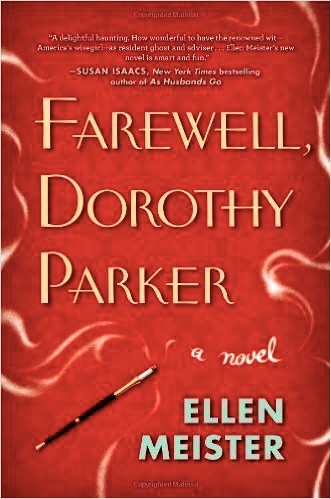 In this first of two “Dorothy Parker novels” by Ellen Meister, Violet Epps, a thirty-seven-year-old movie critic with a major magazine, is waiting for the maître d’ in the lobby of the Algonquin Hotel in New York City to seat her. When a “Dr. Walker” pushes her aside, claiming in a loud voice that he has a reservation, the best Violet can summon up in outrage is the silent wish that she could channel Dorothy Parker’s caustic wit to put this man in his place. Though she can be astute and clever in her reviews, Violet, in her personal life, constantly shrinks from confrontation, “held captive by her own timidity.” Poet and critic Dorothy Parker (1893 – 1967), who eventually materializes to help Violet, held court at the Algonquin’s Round Table throughout the 1920s and became famous among New York’s literary elite for her ability to puncture the pretensions of the arrogant with ascerbic remarks, puns, and bons mots. The Round Table members, consisting of Robert Benchley, Alexander Woollcott, George S. Kaufman, Robert Sherwood, Percy Coates, and others, were so pointed in their comments that they were once described by fellow member, Edna Ferber, as “The Poison Squad,” adding that “They were actually merciless if they disapproved. I have never encountered a more hard-bitten crew.”
In this first of two “Dorothy Parker novels” by Ellen Meister, Violet Epps, a thirty-seven-year-old movie critic with a major magazine, is waiting for the maître d’ in the lobby of the Algonquin Hotel in New York City to seat her. When a “Dr. Walker” pushes her aside, claiming in a loud voice that he has a reservation, the best Violet can summon up in outrage is the silent wish that she could channel Dorothy Parker’s caustic wit to put this man in his place. Though she can be astute and clever in her reviews, Violet, in her personal life, constantly shrinks from confrontation, “held captive by her own timidity.” Poet and critic Dorothy Parker (1893 – 1967), who eventually materializes to help Violet, held court at the Algonquin’s Round Table throughout the 1920s and became famous among New York’s literary elite for her ability to puncture the pretensions of the arrogant with ascerbic remarks, puns, and bons mots. The Round Table members, consisting of Robert Benchley, Alexander Woollcott, George S. Kaufman, Robert Sherwood, Percy Coates, and others, were so pointed in their comments that they were once described by fellow member, Edna Ferber, as “The Poison Squad,” adding that “They were actually merciless if they disapproved. I have never encountered a more hard-bitten crew.”
Violet has not had much luck in her personal life. Her first marriage fell apart, and now she is about to allow her current boyfriend Carl to move in with her – it is easier than telling him that the relationship is over because of his childishness and his drinking. She also has partial (weekend) custody of her niece Delaney, the orphaned child of her sister and brother-in-law who were killed in an automobile accident. She would have had full custody, which she and Delaney both wanted, if the child’s grandparents had not blind-sided her in court with a ferocious lawyer who so intimidated her that she could not speak. She knows that the grandparents and their lawyer will use the same tactic again when the permanent custody hearing comes up in order to gain full custody. Obviously, Violet needs help in all aspects of her personal life, the kind of help which only someone like Dorothy Parker can give.
Dorothy Parker has been living a ghostly life in the Algonquin Hotel for the past forty-five years, dependent upon a quirk of time and a kind of magic for her current “life.” Parker once signed an old guest book on display in the Algonquin’s Blue Bar. Her signature, like those of other Round Table members, guarantees that her spirit will not leave the earth until it has decided it wants to go. If the guest book remains open to the page on which she has signed, Parker’s spirit, like those of other signers, may appear and reappear at will, even to the point of completely taking over the spirit of someone else, if she wants. If the book is closed, the spirit disappears, and if the book is moved, her spirit, with all its other-worldly talents, goes with it.
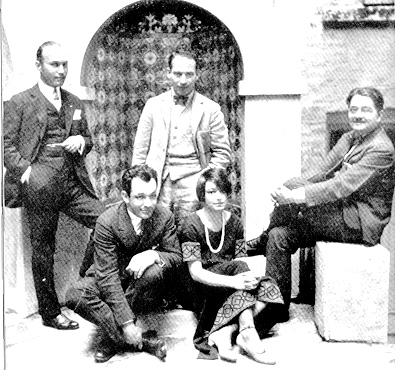
Dorothy Parker with Round Table friends (L – R): Art Samuels, Charles MacArthur, Harpo Marx, Dorothy Parker, and Alexander Woollcott
While Violet is at the Algonquin, the manager, recognizing her reviewing talent and fame, asks her to sign the guest book, and when the opportunity unexpectedly appears, Violet cannot resist taking the guest book with her when she leaves. The spirit of Dorothy Parker happily leaves the Algonquin to go to the house where Violet’s niece Delaney grew up and where Violet is now living. Materializing whenever the book is open, Dorothy Parker delights in taking over the spirit of the weak Violet and creating much-needed havoc in her life. As Dorothy Parker tells her, “You owe Delaney a sincere effort to bring your inner bitch into the light where she belongs.”
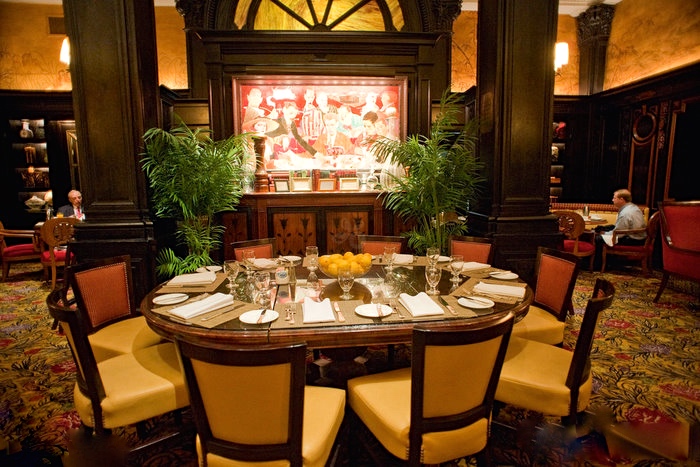
The Algonquin Round Table where the group had lunch. The iconic painting of the group is in the background.
Ellen Meister creates innumerable scenes in which Dorothy Parker shows Violet how to become a stronger person, more like the person she is in her critical writing, and less like the person she really is inside. Why Violet is so timid is suggested through Parker’s psychological analysis of Violet’s background, though Parker still has to take over her body and spirit and make decisions for her, on occasion, so that Violet’s life (and the outcome of the novel) will have the right ending. The novel contains many scenes which, individually, provide a great deal of entertainment, show Dorothy Parker as Meister believes her to be, allow for the nearly one-hundred year difference in time frame (as Dorothy Parker learns how to use the internet, for example), and allow Violet enough freedom to practice what she is learning from Parker in her own life. When Violet falls in love with someone new, the novel becomes more romantic, and when she has problems with her job, it becomes more realistic, creating differences in tone which make it more interesting for the reader.
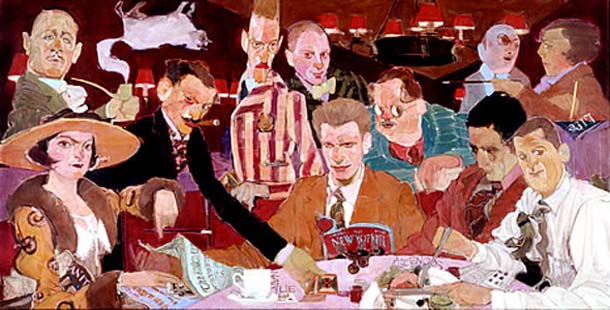
In this painting in the dining room of the Algonquin, Dorothy Parker is on the far left, with Robert Benchley above her, and Mathilde, the Algonquin’s resident cat, seen upside down in Benchley’s smoke.
Unfortunately, it sometimes feels as if Meister does not know when to stop with the complications and the reliance on Dorothy Parker to bail out Violet. A section in which Parker herself confides in Violet about her own problems, while interesting for those who want to know more about Parker, is so contrary to what we know about Parker’s personality that it feels unrealistic. Violet’s own character – a brilliant and caustic wit in her reviews and a person so lacking in confidence that she cannot even fight for the custody of her niece against two grandparents whom Delaney refers to as Lord Sunkist and Lady Munchausen – is too weak and inconsistent to make us believe that Dorothy Parker would care much about her, and though the book is often clever, it is implausible, even considering that it is a ghost story with supernatural overtones.

Fortunately, the second book in the series, Dorothy Parker Drank Here, shows far more confidence on the part of author Ellen Meister, far more attention to the aura surrounding Dorothy Parker, and far more care with the clever repartee one expects of Parker. Though I found this first book, Farewell Dorothy Parker, to be somewhat problematic, I thoroughly enjoyed Dorothy Parker Drank Here, the second book, and it is not necessary to have read this first book in order to understand and appreciate the fun of the second book in the series, which I highly recommend.
Photos, in order: The author’s photo is from http://girlfriendbooks.blogspot.com/
A young Dorothy Parker (in the 1920s) is shown on https://cocktailcalendar.wordpress.com/
Parker and some of her Round Table friends, including Art Samuels, Charles MacArthur, Harpo Marx, and Alexander Woollcott are shown on https://en.wikipedia.org
The Round Table at the Algonquin Hotel, where the group had lunch, is seen on http://www.oyster.com/
The iconic Round Table painting, which appears behind the Round Table, shows Parker on the far left, Robert Benchley behind her, the smoke from his pipe recreating Mathilde, the Algonquin’s resident cat, and Alexander Woollcott in the green jacket: http://www.pbs.org

